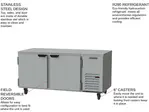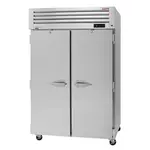Pasta is a dish that is easy to make, but difficult to master. It is a delicate combination of noodles and sauces that need to be in perfect harmony. While it is easy to overcook or undercook pasta, the most widely preferred way to go is al dente. Likewise, for sauces, it is easy to add too much sweetener to tomato-based sauces or overcook dairy in cheese-based options. Carbonara - one of the most popular pasta dishes - is infamous for being notoriously difficult to prepare the traditional way. As a consequence, there are some great options in the supermarket aisle if you are looking for a pre-made pasta sauce. Jarred sauces take the hard work out of making pasta at home, but they also take away the fun part of creating your own signature dish. Even so, it’s always great to have some extra sauce on hand to save time in a commercial kitchen. If you plan on making some of your own sauce, preparing it in bulk and saving it for later usage might be a good idea. So how long does pasta sauce last in the fridge? To answer this question, we need to take a closer look at the ingredients of your sauce and whether it is jarred, canned, or homemade.
How long can pasta sauce stay in the fridge?
First, we’ll talk about homemade pasta sauces. These are usually free of preservatives, so they last for a shorter period in the refrigerator. If you’re dealing with tomato-based sauces such as marinara and puttanesca, the natural acidity of the tomatoes acts as a natural preservative. On the other hand, if you’re dealing with cream or cheese-based sauces like alfredo, it’s best to consume them right away because these sauces tend to break if you reheat them. Tomato-based sauces are more stable and easier to store in this regard. These sauces can last from four to five days in the fridge. To prepare the sauce for refrigeration, cool it down to room temperature and use a sanitized airtight glass jar or plastic container to store it. Once the lid has been sealed, you can store your sauce in the fridge and enjoy your creation when it’s your day away from the stove. What’s even better is that you can also freeze your sauces in airtight bags. Once properly frozen, these can last up to six months in your freezer and retain their flavor profile. To bring your sauce back to life, allow it to defrost at room temperature for a few hours before reheating.
Then, there is the question of store-bought canned or jarred sauces. These sauces have added preservatives to make them shelf-stable. A sealed can or jar can be stored at room temperature for a long time. But how long is pasta sauce good after opening? Once the seal has been broken, it is best to consume the sauce with the pasta of your choice as soon as possible. If you have leftovers, it is not a bad idea to refrigerate the sauce. The preservatives in commercially made sauces help to retain the flavor and textures in the refrigerator longer than homemade sauces. The good thing about store-bought jarred sauces is that even cheese and dairy-based options can be reheated because of stabilizing agents. It is still recommended to consume the sauce within a week of opening and storage. If your sauce comes from a can, it is a good idea to transfer it to a clean glass storage vessel. This reduces the chances of your sauce developing mold and the glass keeps it fresher for longer.
How to Tell If Pasta Sauce is Bad
Generally speaking, the presence of mold is a straight indication that your sauce has gone bad. But if it has not been stored properly, it is possible that it may not be safe for consumption, even if it looks consumable. The acidity of tomato sauce can mask certain odors, so if your sauce tastes sour, has an aftertaste or a rancid odor, it is certainly past its consumption period. It’s a good rule of thumb that if the sauce has stayed in the refrigerator for more than a week, it is probably not a good idea to use it.
How to heat up pasta sauce
Even if your sauce has been properly stored in the commercial refrigerator and is within the safe window for consumption, it is recommended that you heat it up to at least 145 degrees Fahrenheit before using it. Bacteria may thrive in improperly stored sauce and can cause food poisoning. These bacteria can be killed by heating up the sauce properly before using it. If your sauce has been frozen, you can defrost it either by placing it in the refrigerator or thawing it at room temperature for a few hours before warming it up.
In the foodservice industry, sauces are mostly made in large batches and a sizeable amount may go unconsumed. In cases like these, it is necessary to properly store and reheat the sauce as necessary. For instance, when pasta is made in establishments like cafeterias, it is necessary to plan ahead and establish a menu. Sauces like marinara can pair well with different kinds of pasta. Carbonara and homemade alfredo are best served fresh. Some cafeteria menu ideas include careful planning of the week’s list, pairing stored sauces with different kinds of pasta, preparing limited quantities of pasta sauces that cannot be stored in the refrigerator, and using stored sauces to create dishes other than pasta. Storage and warming can be done in units that allow foods to be stored and brought back to life for quick service. This is especially useful in businesses like restaurants, where kitchen areas and dining areas are separate.
At home, the best way to go is to prepare your sauce according to the recipe and if you have leftovers, refrigerate them. You should always take proper precautions to cool down and refrigerate or freeze your sauces. Storage should always be done in airtight containers and freezer bags to ensure there is little to no bacteria growth. Label your containers with the date of preparation and consume within the recommended timeframe. Do remember that dairy and cheese-based sauces do not reheat well after storage, so either make just enough sauce to consume on the same day, or add stabilizers like cornstarch to bind the cheese to the rest of the sauce. Always check the sauce for freshness before reheating and if it smells or tastes off, it means that your sauce has gone bad. The sauce should be brought to room temperature before heating it up again, so allow it a few hours to warm up before you intend to serve the dish. Following these few simple steps can make all the difference between a meal that tastes like leftovers and one that has the aroma of freshness. Bon appetit!












